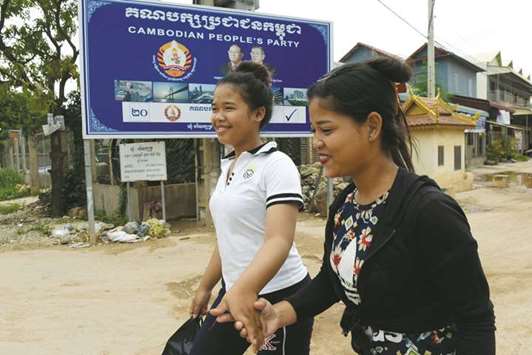The strongman has been in power for 33 years but the vote late last month was widely decried as a sham after a crackdown on the rival Cambodia National Rescue Party (CNRP), which was dissolved by the Supreme Court in November.
A spokesman for the National Election Committee told AFP yesterday as official results were released that the ruling Cambodian People’s Party (CPP) won all 125 seats up for grabs and took nearly 77% of the vote. In a post on his Facebook page later Wednesday Hun Sen said the election was “free, fair and just.” Cambodia’s new government will be formed next month but problems of credibility could dog the regime as experts believe Hun Sen will try to bolster popular support at home.
“It’s like pushing a cart uphill,” said independent political analyst Meas Ny. “From now on the new government will be under attack and defending itself.” The results were in line with preliminary tallies and Hun Sen said in a speech earlier in the day that he would take suggestions from parties who contested the election on ideas to “build the country.”
Nineteen other political parties took part in the sixth national vote since UN-backed polls in 1993 but many are new or obscure and posed no challenge. The dissolved opposition is planning on ramping up efforts with governments abroad to put more pressure on Hun Sen. “We will not abandon more than half of the country who voted for change but were excluded from exercising their choice,” Mu Sochua, deputy CNRP leader, told AFP from self-exile.
The White House has said it would consider expanding travel sanctions against Cambodian officials but so far no punitive actions have been taken. The CPP pointed to 83% voter turnout as evidence that a boycott by the opposition failed, but allegations of voter intimidation and some 600,000 spoiled ballots undermined the claims. Hun Sen has held onto power for decades through a complex mix of development dollars and alliances in the police, army and courts.
The 66-year-old helped bring roads and mega-malls to a country ravaged by decades of civil war and the Khmer Rouge regime, which killed a quarter of the Cambodian population from 1975 to 1979. A former commander in the group, he defected and was installed as prime minister in 1985 at the age of 32, later presenting himself as saviour while warning of conflict if his regime falls.
The message has resonated with segments of society. “I don’t care about having a one-party parliament. What I want is calm after the election,” a tuk-tuk driver named Nhem Ry told AFP ahead of the results, which were in line with forecasts.
“We had demonstrations during previous elections which I do not like.”
Western governments pulled funding for the vote and condemned it as not credible, but China, which has showered the country with loans and stayed silent on human rights issues, maintained support. Independent election monitors also steered clear but representatives of populist parties in Europe and Asia filled the void. The CPP has long dominated Cambodia but the CNRP, which was founded in 2012, capitalised on discontent with corruption and inequality.
It earned 44% of the vote in 2013 and took home a similar amount in local 2017 elections. Analysts say the threat to Hun Sen prompted a rewind of democratic freedoms as civil society, NGOs and the press were squeezed in the run-up to this year’s ballot.

